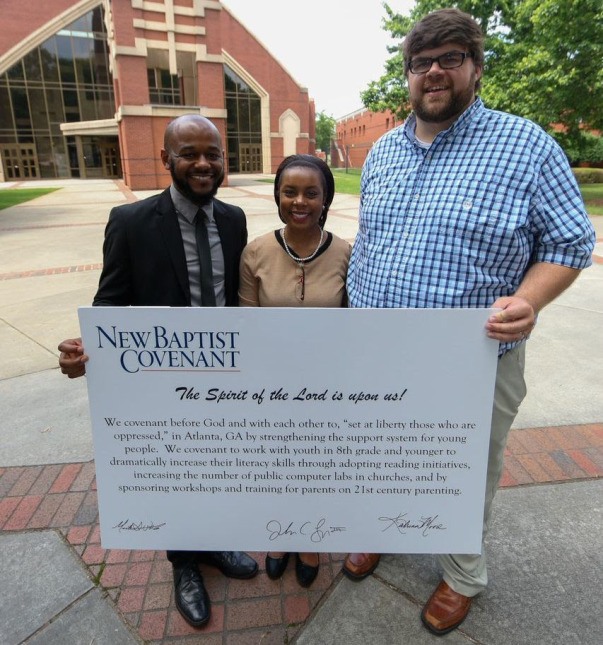A Baptist inner-city minister says he sees parallels today to the disappointment with white moderate attitudes expressed 53 years ago in Martin Luther King’s famous “Letter from a Birmingham Jail.”
“I honestly think silence of the church in this era is not dissimilar from the silence of the church in the Civil Rights Movement,” Trey Lyon, pastor of communication and engagement at Park Avenue Baptist Church in Atlanta, said Aug. 20 on State of Belief Radio with former Interfaith Alliance head Welton Gaddy.
Lyon, commissioned as a Cooperative Baptist Fellowship field personnel in 2011, recalled King’s lament that “the most appalling thing was the silence of his friends, not the vitriol of his enemies.” Lyon was interviewed about an upcoming New Baptist Covenant gathering in Atlanta.
Lyon, who works at the church thanks to a partnership with the Decatur, Ga.,-based CBF, told Gaddy, an ordained Baptist minister who preaches at Northminster Church in Monroe, La., the New Baptist Covenant movement envisioned by former President Jimmy Carter has enabled the historically white Park Avenue Baptist Church to reconnect historic ties with Ebenezer Baptist Church, the home church of King.
Lyon said Park Avenue Baptist Church was founded shortly after the Civil War in what today is known as the Old Fourth Ward in Atlanta. Around 1900 the church relocated about a mile away, selling the old building and property to an African-American congregation that eventually became Ebenezer Baptist Church.
Lyon described about a year ago digging through some historical records and finding “an eyewitness account” written in the early part of the 20th century reporting that members left the old neighborhood “because apartments were being built and the Negroes were moving in.”
“It was kind of a pit in my stomach when I read that,” Lyon said. “We had always kind of had a hunch, but this was confirmation. Tragically, Park Avenue wasn’t alone in that. That was the plight of most white, certainly Baptist churches, as that’s the history of the [Southern Baptist] Convention.”
Lyon said an ongoing part of his ministerial calling is “how do we recognize that our historical institutions have this legacy knit into them.”

Michael Wortham of Ebenezer Baptist Church, Katrina Moore of the Greater Piney Grove Baptist Church and Trey Lyon of Park Ave Baptist Church display a Covenant of Action linking their congregations in partnership missions.
He said the New Baptist Covenant provides a framework for moving toward not just reconciliation but also “having difficult conversations about how we go forward and true racial justice.”
“The New Baptist Covenant brought us together,” Lyon described the two congregations now linked by a Covenant of Action. “Though there have been these sort of loose connections throughout the years, it gave us the opportunity to say, ‘OK, what work can we do now to impact our communities jointly?”
For Ebenezer and Park Avenue it was helping kids to read at grade level, a key predictor of who will eventually graduate from high school and go to college.
“I don’t think anybody’s ever going to be upset when you say we want to work together to help advance our children,” said Michael Wortham, assistant pastor of college and young adult ministries at Ebenezer Baptist Church.
Former President Carter, a lifelong Baptist, brought together leaders from more than 30 Baptist organizations in 2007 to seek common ground in a denomination frequently identified not by what they are for but rather for what they are against.
They settled on a passage in the Gospel of Luke, where Jesus announced: “The Spirit of the Lord is on me, because he has anointed me to proclaim good news to the poor. He has sent me to proclaim freedom for the prisoners and recovery of sight for the blind, to set the oppressed free, to proclaim the year of the Lord’s favor.”
Lyon said those words “sort of become the credo” for churches to ask “how do we go out and accomplish the things Jesus talked about that the spirit enables us to do?”
“How do we preach good news to the poor?” he asked. “What does that actually look like?”
“How do we proclaim recovery of sight to those who are blinded in some way? When we talk about white privilege or power or any of these sorts of really intricate things, oftentimes folks just don’t see that. If we’re living in covenant we’re relating to one another. We’re working together.”
More than 15,000 people attended the first New Baptist Covenant gathering in Atlanta in 2008. After subsequent gatherings in 2009, 2011 and 2015, the movement turned local, promoting Covenants of Action to link black and white churches in joint hands-on ministry addressing needs in their community.
Concerned about a resurgence of racial tension in the United States over the last couple of years, Carter announced plans in May for another New Baptist Covenant Summit Sept. 14-16 in Atlanta.
Carter is scheduled as a keynote speaker at the gathering at the Downtown Hilton, along with Traci Blackmon, acting executive minister of justice and witness at the United Church of Christ.
Frederick Haynes III, senior pastor at Friendship-West Baptist Church, and Pastor George Mason of Wilshire Baptist Church — involved in one of the first covenant partnerships in Dallas — will also deliver keynote addresses.
